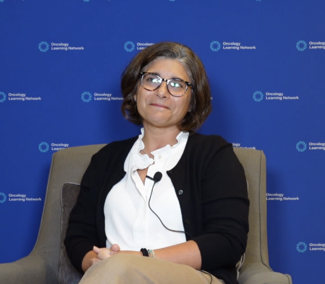Alpelisib Plus Olaparib Fails to Improve Outcomes For Platinum-Resistant/Platinum-Refractory High-Grade Serous Ovarian Cancer
According to primary analysis results from the phase 3 EPIK-O/ENGOT-ov61 trial, alpelisib, a PI3K inhibitor, plus olaparib, a PARP inhibitor, did not improve outcomes compared to physician’s choice single-agent chemotherapy among previously treated patients with platinum-resistant or platinum-refractory high-grade serous ovarian cancer with no known BRCA mutations.
“Patients with platinum-resistant/platinum-refractory high-grade serous ovarian cancer without a BRCA mutation have poor prognosis and limited treatment options,” stated Panagiotis A. Konstantinopoulos, MD, PhD, Dana-Farber Cancer Institute, Boston, Massachusetts, and coauthors. “The synergism between PARPis and PI3K inhibitors has been demonstrated in breast and ovarian cancer preclinical studies.”
In this open-label trial, researchers enrolled 358 patients who underwent 1 to 3 prior lines of systemic therapy and prior bevacizumab. Patients were randomized on a 1-to-1 basis to receive either 200 mg of once daily alpelisib plus 200 mg of twice daily olaparib (n = 180) or physician’s choice of either once weekly 80 mg/m2 of paclitaxel or 40 to 50 mg/m2 of pegylated liposomal doxorubicin once every 28 days (n = 178). The primary end point was progression-free survival (PFS). Key secondary end points included overall response rate (ORR), duration of response, overall survival (OS), and safety.
At a median follow-up of 9.3 months, median PFS was 3.6 months in the alpelisib plus olaparib arm and 3.9 months in the single-agent chemotherapy arm (hazard ratio [HR] 1.14; 95% confidence interval [CI], 0.88 to 1.48; P = .84). The ORR was 15.6% in the alpelisib plus olaparib arm and 13.5% in the single-agent chemotherapy arm and median OS was 10 months and 10.6 months, respectively. The most common grade ≥3 adverse events occurring in the alpelisib plus olaparib arm included hyperglycemia (18.9%), vomiting (10%), nausea (9.4%), and anemia (7.2%). Treatment discontinuation due to an adverse event occurred in 14.4% of patients in the alpelisib plus olaparib arm and 7.3% of patients in the physician’s choice arm. Serious treatment-related pneumonia led to 1 death in the alpelisib plus olaparib arm.
Results demonstrated that “the combination of alpelisib and olaparib did not have a PFS benefit compared with single-agent chemotherapy of physician's choice in patients with platinum-resistant/platinum-refractory [high-grade serous ovarian cancer] with no BRCA mutation,” concluded Dr Konstantinopoulos et al. “Additional treatment strategies are being explored in platinum-resistant [high-grade serous ovarian cancer], and additional research into novel targeted therapies is warranted to address the unmet needs in this patient population.”
Source:
Konstantinopoulos PA, Kim JW, Freyer G, et al. Primary analysis of EPIK-O/ENGOT-ov61: Alpelisib plus olaparib versus chemotherapy in platinum-resistant or platinum-refractory high-grade serous ovarian cancer without BRCA mutation. J Clin Oncol. Published online: July 23, 2025. doi: 10.1200/JCO-25-00225














